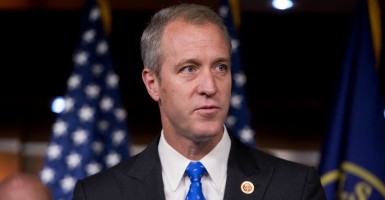On Wednesday night, 42 Republican members of Congress joined the Democrats to vote for President Barack Obama’s transgender agenda.
Whereas last week Congress voted to reject this proposal—known as the Maloney amendment—last night they voted to ratify Obama’s 2014 executive order barring federal contractors from what it describes as “discrimination” on the basis of “sexual orientation and gender identity” in their private employment policies.
And, of course, “discrimination” on the basis of “gender identity” can be something as simple as having a bathroom policy based on biological sex, not gender identity, as we learned last week from Obama’s transgender directives. And “discrimination” on the basis of “sexual orientation” can be something as reasonable as an adoption agency preferring married moms and dads for orphans, than other arrangements.
Indeed, in the past few weeks we’ve seen additional examples of what counts as “discrimination” on the basis of “gender identity.”
- The New York City Commission on Human Rights issued official legal guidance saying employers can be fined up to $250,000 for not addressing employees by the pronoun of their choice—including pronouns such as “ze” and “hir.” As UCLA law professor Eugene Volokh explains, this would require “employers and businesses to prevent [the use of “wrong” pronouns] by co-workers and patrons and not just by themselves or their own employees.”
- A public school district in Oregon paid a teacher $60,000 because colleagues declined to use the pronoun “they” to describe the teacher. The teacher, Leo Soell, does “not identify as male or female but rather transmasculine and genderqueer, or androgynous.” As Volokh explains: “Soell wants people to call Soell ‘they,’ and submitted a complaint to the school district objecting (in part) that other schoolteachers engaged in ‘harassment’ by, among other things, ‘refusing to call me by my correct name and gender to me or among themselves’ (emphasis added).”
- The 4th Circuit Court has said a Virginia school district must allow bathroom access based on “gender identity” not biology. The school district created a policy that says bathroom and locker room access is primarily based on biology, while also creating accommodations for transgender students: only biological girls can use the girls’ room, only biological boys can use the boys’ room, and any student can use one of the three single-occupancy bathrooms, which the school created specifically to accommodate transgender students. But the court said this commonsense policy was itself “discrimination” on the basis of “gender identity.”
Congress should not be ratifying Obama’s radical transgender agenda and imposing these outcomes on private employers just because they contract with the government.
All Americans should be free to contract with the government without penalty because of their reasonable beliefs about contentious issues. The federal government should not use government contracting to reshape civil society about controversial issues that have nothing to do with the federal contract at stake.
Obama’s executive order and the Maloney amendment treat conscientious judgments about behavior as if they were invidious acts of discrimination akin to racism or sexism.
But sexual orientation and gender identity are not like race. Indeed, sexual orientation and gender identity are unclear, ambiguous terms. They can refer to voluntary behaviors as well as thoughts and inclinations, and it is reasonable for employers to make distinctions based on actions.
By contrast, “race” and “sex” clearly refer to traits, and in the overwhelming majority of cases, these traits (unlike voluntary behaviors) do not affect fitness for any job.
Congress tried to minimize the damage of the Maloney amendment with two provisions last night. One provision, introduced by Rep. Joe Pitts, R-Pa., amended the Maloney amendment to say that it couldn’t violate the U.S. Constitution. Another provision, the Byrne Amendment, attempted to attach existing religious liberty protections to the bill. Neither adequately protects against the damage of Maloney.
Liberal activist judges will do all they can to ensure that sexual orientation and gender identity policies will trump religious liberty protections.
Here is a list of the 42 Republicans who voted for the amendment:
Justin Amash, Mich.
Susan Brooks, Ind.
Mike Coffman, Colo.
Ryan Costello, Pa.
Carlos Curbelo, Fla.
Rodney Davis, Ill.
Jeff Denham, Calif.
Charlie Dent, Pa.
Mario Diaz-Balart, Fla.
Bob Dold, Ill.
Daniel Donovan, N.Y.
Tom Emmer, Minn.
Michael Fitzpatrick, Pa.
Rodney Frelinghuysen, N.J.
Chris Gibson, N.Y.
Joe Heck, Nev.
Will Hurd, Texas
Darrell Issa, Calif.
David Jolly, Fla.
John Katko, N.Y.
Adam Kinzinger, Ill.
Leonard Lance, N.J.
Frank LoBiondo, N.J.
Tom MacArthur, N.J.
Martha McSally, Ariz.
Pat Meehan, Pa.
Luke Messer, Ind.
Erik Paulsen, Minn.
Bruce Poliquin, Maine
Tom Reed, N.Y.
David Reichert, Wash.
Jim Renacci, Ohio
Tom Rooney, Fla.
Ileana Ros-Lehtinen, Fla.
Elise Stefanik, N.Y.
Fred Upton, Mich.
David Valadao, Calif.
Greg Walden, Ore.
Mimi Walters, Calif.
David Young, Iowa
Todd Young, Ind.
Lee Zeldin, N.Y.
Update: Rep. John Shimkus, R-Ill., issued a statement Thursday saying his vote Wednesday was “recorded incorrectly,” per his press release.
My position on this issue has not and will not change,” Shimkus said in a statement. “I’ve consistently defended religious liberty and I always will. During a series of 14 votes on the House floor, I accidentally cast a ‘yea’ vote for the Maloney Amendment when I intended to vote ‘nay.’ I regret the mistake.




























